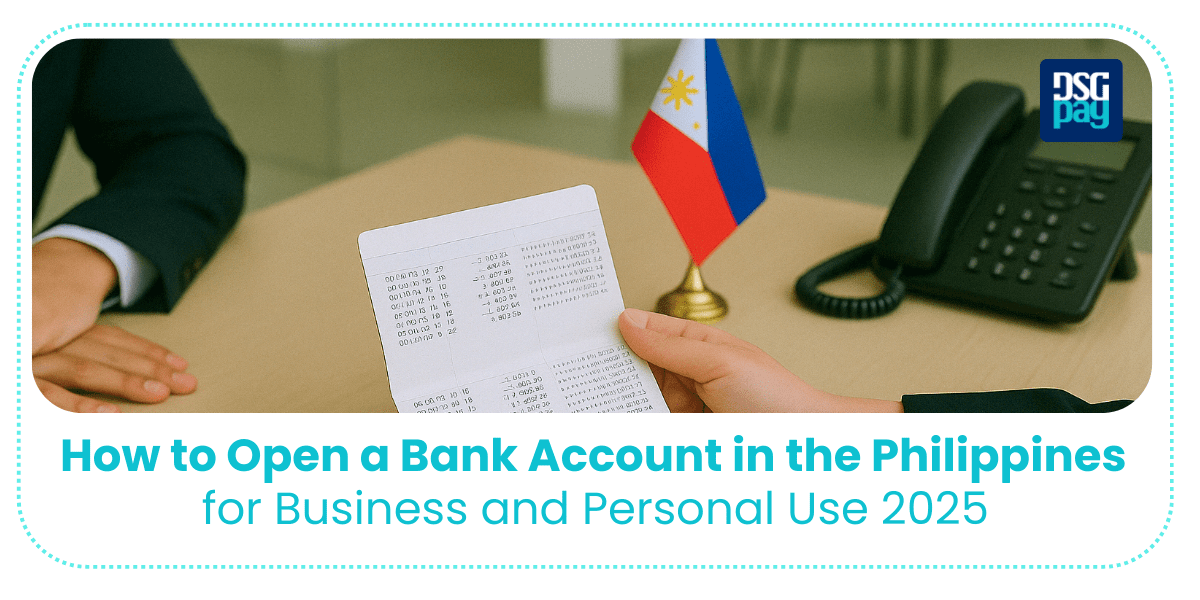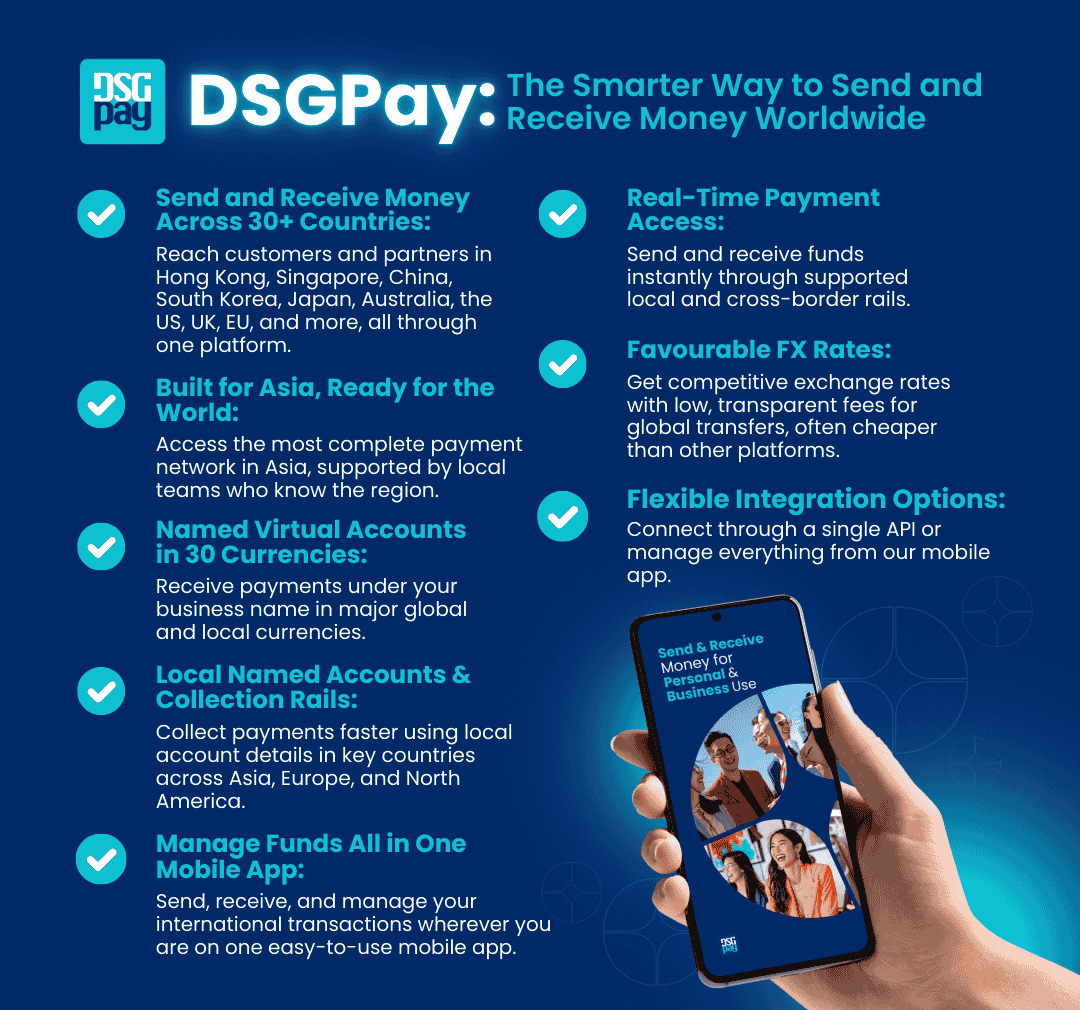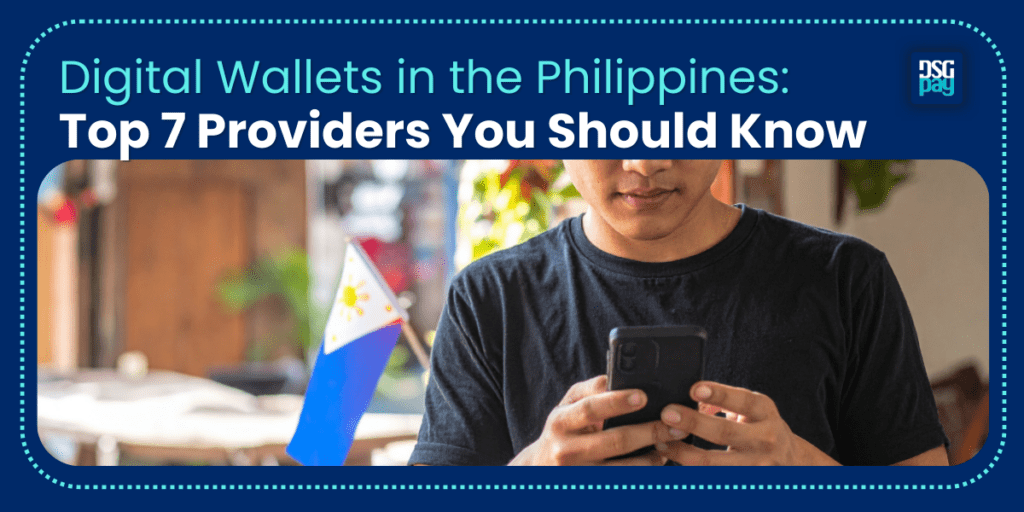If you’re planning a move to the Philippines or looking at it as your next market for business expansion, one of the most practical things you can do early on is open a local bank account. And if you want to know how to open a bank account in the Philippines, this guide is for you.
The Philippines continues to attract interest from international professionals and investors. With GDP growth reaching 5.6% in 2024, it’s a region worth considering for long-term plans.
Having a Philippine bank account makes it easier to manage your money, pay bills, and receive payments.
Here, we’ll walk you through the essentials: what documents you need, how the process actually works, and which banks are best suited for expats.
Table of Contents
Key Takeaways
- You need a valid ID and proof of address to open a bank account in the Philippines.
- Most banks require you to visit in person to open an account.
- Be ready to make a small opening deposit, which varies by bank.
- Choose a bank that fits your personal or business needs.
- Foreigners can open accounts if they have the right visa and documents.
Requirements to Open a Bank Account in the Philippines
If you want to open a bank account in the Philippines, you need to be a resident. That means either temporary or permanent. If you’ve been in the country for at least 60 days, you’re classed as a ‘resident alien’. It just means you can open the same kinds of accounts as locals.
Though some banks like BDO Unibank may allow you to create an account online but majority of banks want to see you in person. Remote account opening isn’t a common thing here. You’ll need to show up with a valid passport, a visa, and possibly a few more documents depending on the bank. The rules vary, so it’s worth checking directly with the branch before you go.
How to Open a Bank Account in the Philippines: Step-by-Step Process
Opening a bank account in the Philippines isn’t complicated, but you’ll want to be prepared so you’re not wasting time going back and forth.
Step 1: Pick Your Bank Wisely
Whether you choose a global name like Citibank or stick with a solid local option like BDO or Metrobank, it starts with choosing the right fit. Some offer online applications, but you’ll still need a physical Philippine address.
Step 2: Visit the Nearest Branch
Pop into a local branch of your chosen bank. Bring every required document with you. You’ll likely speak with a bank manager who will explain the account types and check your eligibility.
Step 3: Fill in the Application Form
Carefully complete the form. This usually includes your TIN (if applicable), personal details, and any references the bank asks for. Sign everything as required.
Step 4: Make the Initial Deposit
Banks often require a minimum deposit to get your account up and running.
Step 5: Collect Your Account Info
Once approved, you’ll get your account number. Some banks will also hand over your ATM card and PIN on the spot, while others may ask you to come back in a few days.
By following these steps, you’ll be ready to open a bank account in the Philippines and start managing your finances smoothly.
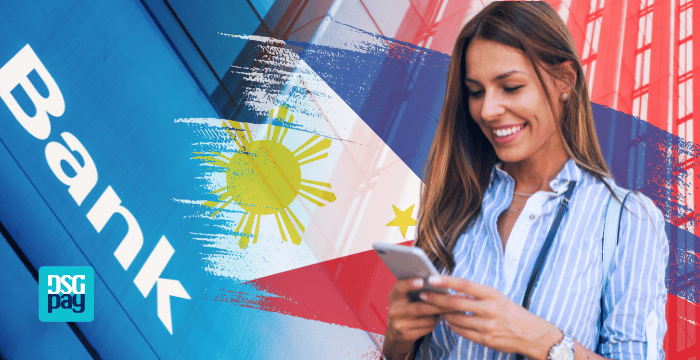
Documents Needed to Open a Bank Account in the Philippines as a Foreigner
Before heading to the bank, make sure you have everything you need to open a bank account in the Philippines. Missing even one document could slow things down, and who wants that?
For a Personal Account
- Valid ID: Bring two government-issued IDs. Your passport and driving licence usually do the trick.
- Proof of Address: A utility bill or rental agreement that shows your Philippine address.
- ACR I-Card: The Alien Certificate of Registration Identity Card is a microchip-enabled ID issued to foreigners who are legally registered in the Philippines. (Only applies if you’ve been in the country for more than 59 days.)
You can find more information about ACR card here.
For a Business Account
- Business Registration Docs: Paperwork from the BIR and DTI. These prove your business is legit.
- Proof of Business Address: This could be a utility bill or lease.
- TIN (Tax Identification Number): The official one for your business.
- Authorised Signatories’ IDs: Two valid IDs for anyone listed to handle the account.
- Bank’s Application Form: Each bank has its own form. You will need to fill it out.
Other Essentials You Might Need to Open a Bank Account in the Philippines
- Photo ID: You’ll need at least one valid, government-issued ID for identity checks.
- Passport-size Photos: Not always needed, but some banks ask for one or two for their records.
- Minimum Deposit: Every bank has a different amount so it’s best to check beforehand.
Best Philippines Bank Accounts for Expats
Opening a local account is about more than just storing money. You want a bank that actually works for you, fits your lifestyle, and makes managing your money easy while you’re living abroad.
Here’s a quick look at the top options:
1. BDO – Built for Expats and OFWs (Overseas Filipino Workers)
BDO’s Kabayan Savings account is ideal if you’re just getting started. No minimum balance for the first year means less pressure upfront. Their massive branch network across the country makes in-person banking convenient too.
2. Metrobank – Great for Foreign Currency Accounts
Metrobank is a strong choice if you’re earning in dollars, euros, or another currency. Their foreign currency accounts give you flexibility with international transactions, and they strike a good balance between local support and global access.
3. HSBC – For Global Banking Needs
HSBC is the go-to if you want seamless global services. Their Advance Account offers perks like higher ATM limits and smooth international access. Ideal if you’re managing money across multiple countries.
4. BPI – Straightforward and Reliable
Looking for something simple? BPI’s Family Savings Account offers low fees, decent interest, and user-friendly digital tools. Great for daily banking and perfect if you want to keep things efficient and stress-free.
5. Security Bank – Excellent Customer Service
If support matters to you, Security Bank delivers. Known for responsive service and a clean digital experience, it’s one of the easiest banks for expats to use, especially if you want smooth online banking without the drama.
Virtual Account: An Alternate Solution to a Local Bank Account
Opening a virtual account is a smarter choice than sticking with a traditional local bank account, especially if you’re managing finances internationally. With a virtual account, you can handle multiple currencies in one place, which means no more juggling between different banks or accounts.
Plus, you won’t need to waste time visiting physical branches. Everything is done online, from the comfort of your home.
What’s even better? Virtual accounts are far more cost-effective. They offer low, transparent fees, unlike local banks that can surprise you with hidden charges.
Transactions are also faster, so you can access your funds quickly, perfect for anyone needing to move money swiftly. So, in a nutshell, opening a virtual account makes managing your finances simpler, faster, and more efficient than trying to open a bank account in the Philippines the traditional way.
Introducing DSGPay: A Smarter Way to Manage Your Money in the Philippines and Beyond
Managing your finances across borders or in the Philippines doesn’t have to be complicated. Instead of opening a bank account to manage PHP, you can resort to DSGPay, your all-in-one global money transfer solution.
Whether you’re an expat, a freelancer, or running a business, DSGPay offers a seamless solution for sending and receiving money in multiple currencies with low fees.
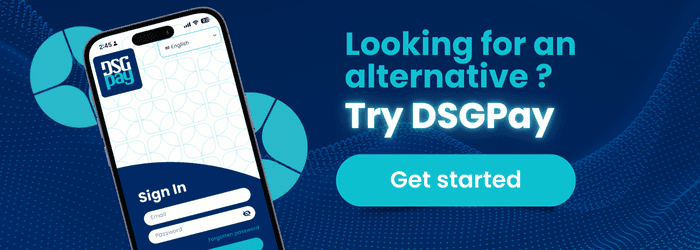
Why choose DSGPay as an alternative to a bank account
- Open a PHP Account to Get Paid Like a Local: DSGPay’s named virtual account can be set up specifically in your business name without needing a physical bank account. So, you can receive payments as a local transfer.
- Support Over 30 Currencies: DSGPay lets you send and receive money 30+ currencies, all in one account.
- Manage High-Volume Transactions: Support for large amounts of money transfers.
- Clear, Low Fees: Enjoy competitive FX rates and low fees, so you always know exactly what you’re paying for.
- Fast, Secure Transfers: DSGPay ensures your transactions are fast and protected with an advanced anti-fraud system.
- Effortless Setup: All done online, no matter where you are.
- Dedicated Customer Support: They’re committed to ensuring your experience is smooth and hassle-free.
Whether you’re settling into life in the Philippines or running a business with international reach, DSGPay streamlines your finances, making it easier to manage money in the Philippines and across borders.
Ready to simplify your global finances?
